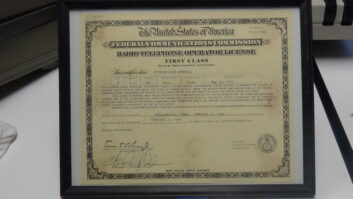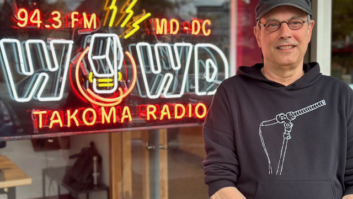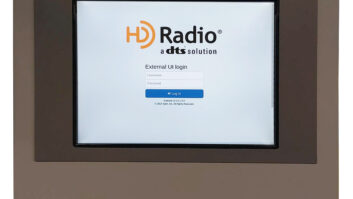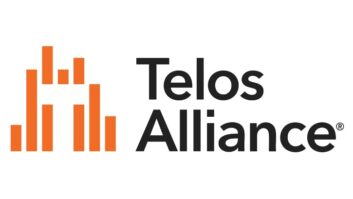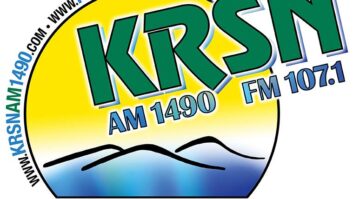Many times, buried deep in the type-heavy releases known as the daily Public Notices issued by the Federal Communications Commission, simple single-sentence statements turn out to be complicated, real-world broadcasting tribulations.
Last week, two eyebrow-raising memos were of particular note. They were rescinded notices for two LPFM license applications. They are located more than 2,100 miles apart in two cities that probably couldn’t be less like one another: one for a low-power FM license in Decatur, Ga., the other for one in North Hollywood, Calif.
But from here on, there are more similarities than differences. In both cases, it seems that the license application grants were rescinded based on allegations that no antenna or tower had actually been constructed. In both cases, the application was returned to “pending status” awaiting some sort of response from the licensees themselves.
For Able Solutions Counseling Ministries in Decatur, the journey started smoothly. Able Solutions submitted an application in 2014 for a new low-power station, WJEU(LP), to be built in this southern town of 20,000. The first hiccup occurred on Jan. 27 of this year when the Media Bureau wrote to Able Solutions that a recent engineering study revealed that its submitted proposal failed to meet minimum tower and antenna height requirements. (The study found that the proposed facility would create an average 60 dBu contour distance of 3.2 km, even though the minimum required contour distance is 4.7 km.) As a result, the application was dismissed.
Two weeks later, Dickey Broadcasting submitted a petition for reconsideration to the FCC, asking that it rescind the Able Solutions license due to “lack of candor and misrepresentation.”
According to Dickey, which owns three FM stations and several translators in Georgia, Able Solutions filed an application for an LPFM license and certified that the facility was constructed as authorized. This application was signed by Charles Walton, president and CEO of Able Solutions Counseling Ministries.
But on Feb. 17, broadcast engineer Gary Kline visited the site and, according to the Dickey filing, did not locate an antenna of any kind, nor hear any audible broadcast signal from 103.7 MHz, the frequency upon which WJEU is authorized to broadcast. Dickey stated in its filing: “In this case, the licensee has breached its duty of candor to the FCC and made material misrepresentations in its application by claiming that its antenna facility has been constructed when it plainly has not been.”
Dickey also questioned the FCC over its decision to grant the licensee’s application on the exact same day that it was filed.
“That was an extremely unusual action by the commission which, in virtually all other cases, takes a reasonable amount of time to review and consider applications before acting on them,” the Dickey filing said. “A license grant in a matter of minutes or, at most hours, after filing is almost unknown. There is no explanation in the FCC’s online records for WJEU(LP) to justify that lightning-bolt grant.”
Three weeks later, the FCC rescinded the grant and said Able Solutions has the opportunity to respond to the allegations. As of press time, no response has been released. Radio World did not receive a response to its inquiries for comment from Able Solutions.
On the very next line of the same Public Notice, a similar story seemed to be playing out in North Hollywood.
On March 28, the Media Bureau sent a letter to Addy Gonzalez at 11:11 A Creative Collective, which is licensee of KQEE(LP) in North Hollywood, saying that the Enforcement Bureau received an emailed complaint stating that no station had been constructed in preparation for the KQEE(LP) broadcast license. When reached via email, 11:11 declined to comment.
In this case as well, the Media Bureau rescinded the grant of KQEE’s application and returned it to pending status, awaiting response from 11:11 A Creative Collective.
How common might this be? One observer is Michelle Bradley, founder of low-power FM advocacy group REC Networks, who commented about the issue to Radio World in general terms.
Bradley said her organization has received reports of construction permits being covered with subsequent filings of FCC Form 319 forms and sometimes no real construction has taken place. “We are seeing CP holders who seem to be filing 319s on or just before the expiration date of the permit in order to try to ‘save’ the permit, thinking that no one will notice,” she said.
If the FCC finds a lack of candor, she said, it will make it difficult for any party involved in the LPFM station to get an FCC license because they may be required to disclose the case as an adverse action. “Making false statements to the FCC is a federal crime and a violation of the rules,” she said.
Bradley said she also noticed that the FCC has been holding grants of LPFM license applications for more than two weeks, when they normally grant them on Mondays. “I agree with a holding period after a license to cover is filed so if any parties that have information that disputes the statements made by the applicant can be entered into the record,” she said.
Radio World has reached out to the FCC about the speed with which LPFM licenses are being granted and will share any information gleaned.





